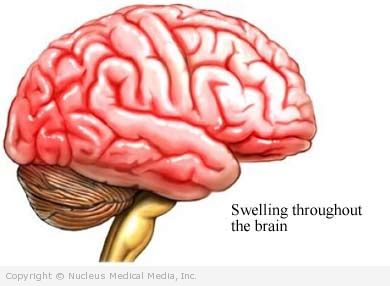Encephalitis – Definition
Encephalitis is swelling of the brain. The swelling may involve the whole brain, or just parts of the brain. Encephalitis may just occur in individuals (sporadic) or may affect many people in a particular area (epidemic).
Encephalitis – Causes
Encephalitis is most often caused by a viral infection. In the United States, the most common cause of sporadic encephalitis is the herpes simplex virus (HSV). Epidemic encephalitis are usually mosquito or tick-borne viruses.
The most common viruses that cause encephalitis include:
- Viruses carried by mosquitoes such as West Nile virus
- Chickenpox virus
- Herpes simplex virus (HSV)
- Polio virus
- Epstein-Barr virus (EBV)
- Measles virus
- Mumps virus
- Rotavirus
- Influenza virus
- Rabies
- Enterovirus
Not all encephalitis is caused by a virus. Some may be due to an overreaction of the immune system.
Encephalitis – Risk Factors
Factors that may increase your chance of encephalitis include:
- Living, working, or playing in an area where mosquito-borne viruses are common
- Not being immunized against diseases such as:
- Measles
- Mumps
- Chickenpox
- Polio
- Having cancer
- Taking immunosuppressive medicines after organ transplant
- Having AIDS
- Newborns of mothers who have genital herpes simplex are at risk for herpes simplex encephalitis.
Encephalitis – Symptoms
The symptoms may range from mild to severe. Severe symptoms can include permanent neurological damage. Encephalitis can also lead to death.
Milder symptoms include:
- Fever
- Weakness, severe fatigue
- Headache
- Sensitivity to light
- Stiff neck and back
- Vomiting
- Muscle aches
- Rash
- Yawning
More severe symptoms may include:
- Changes in consciousness
- Personality changes
- Confusion
- Irritability
- Seizures
- Partial or complete paralysis
- Progressive drowsiness
- Trouble walking
- Trouble speaking
- Trouble swallowing
Encephalitis – Diagnosis
The doctor will ask about your symptoms and medical history. A physical exam will be done.
Tests may include:
- Blood tests — to look for signs of infection
- Spinal tap (lumbar puncture) — to test cerebrospinal fluid (CSF) for signs of infection
- CT and/or MRI scans of the head — to look for abnormal areas of enhancement, hemorrhage, or edema in the brain
- Electroencephalogram (EEG) — to look for abnormal electrical activity in the brain
- Brain biopsy — removal of a small sample of brain tissue to test for signs of infection
Encephalitis – Treatment
Treatment is mostly supportive. It may include:
- Antiviral drugs (eg, intravenous acyclovir for herpes simplex encephalitis)—to potentially help shorten the duration of the illness
- Steroid medicines — to decrease brain swelling
- Diuretics such as mannitol — to decrease elevated intracranial pressure
- Intubation with hyperventilation — to decrease elevated intracranial pressure and to maintain respiration and ventilation
- Anticonvulsant medicines — to prevent and/or treat seizures
Encephalitis – Prevention
Make sure that you and your children are vaccinated against preventable viral illnesses.

